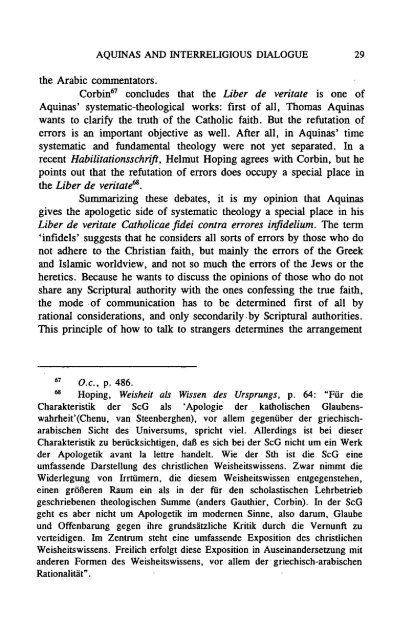Jaarboek Thomas Instituut 1997 - Thomas Instituut te Utrecht
Jaarboek Thomas Instituut 1997 - Thomas Instituut te Utrecht
Jaarboek Thomas Instituut 1997 - Thomas Instituut te Utrecht
Create successful ePaper yourself
Turn your PDF publications into a flip-book with our unique Google optimized e-Paper software.
AQUINAS AND INTERRELIGIOUS DIALOGUE 29<br />
the Arabic commentators.<br />
Corbin" concludes that the Liber de verita<strong>te</strong> is one of<br />
Aquinas' sys<strong>te</strong>matic-theological works: first of all, <strong>Thomas</strong> Aquinas<br />
wants to clarify the truth of the Catholic faith. But the refutation of<br />
errors is an important objective as well. Af<strong>te</strong>r all, in Aquinas' time<br />
sys<strong>te</strong>matic and fundamental theology were not yet separa<strong>te</strong>d. In a<br />
recent Habilitationsschrift, Helmut Hoping agrees with Corbin, but he<br />
points out that the refutation of errors does occupy a special place in<br />
the Liber de veritatë",<br />
Summarizing these deba<strong>te</strong>s, it is my opinion that Aquinas<br />
gives the apologetic side of sys<strong>te</strong>matic theology a special place in his<br />
Liber de verita<strong>te</strong> Catholicae fidei contra errores infidelium. The <strong>te</strong>rm<br />
'infidels' suggests that he considers all sorts of errors by those who do<br />
not adhere to the Christian faith, but mainly the errors of the Greek<br />
and Islamic worldview, and not so much the errors of the Jews or the<br />
heretics. Because he wants to discuss the opinions of those who do not<br />
share any Scriptural authority with the ones confessing the true faith,<br />
the mode· of communication has to be de<strong>te</strong>rmined first of all by<br />
rational considerations, and only secondarily. by Scriptural authorities.<br />
This principle of how to talk to strangers de<strong>te</strong>rmines the arrangement<br />
67 O.c., p. 486.<br />
68 Hoping, Weisheit als Wissen des Ursprungs, p. 64: "Für die<br />
Charak<strong>te</strong>ristik der ScG als 'Apologie der. katholischen Glaubenswahrheit'(Chenu,<br />
van S<strong>te</strong>enberghen), vor allem gegenüber der griechischarabischen<br />
Sicht des Universums, spricht viel. Allerdings ist bei dieser<br />
Charak<strong>te</strong>ristik zu berücksichtigen, daB es sich bei der ScG nicht urn ein Werk<br />
der Apologetik avant la lettre handelt. Wie der Sth ist die ScG eine<br />
umfassende Dars<strong>te</strong>llung des christlichen Weisheitswissens. Zwar nimmt die<br />
Widerlegung von Irrtümern, die diesem Weisheitswissen entgegens<strong>te</strong>hen,<br />
einen gröBeren Raum ein als in der fiir den scholastischen Lehrbetrieb<br />
geschriebenen theologischen Summe (anders Gauthier, Corbin). In der ScG<br />
geht es aber nicht urn Apologetik im modernen Sinne, also darum, Glaube<br />
und Offenbarung gegen ihre grundsätzliche Kritik durch die Vemunfi zu<br />
ver<strong>te</strong>idigen. 1m Zentrum s<strong>te</strong>ht eine umfassende Exposition des christlichen<br />
Weisheitswissens. Freilich erfolgt diese Exposition in Auseinandersetzung mit<br />
anderen Formen des Weisheitswissens, vor allem der' griechisch-arabischen<br />
Rationalität" .








